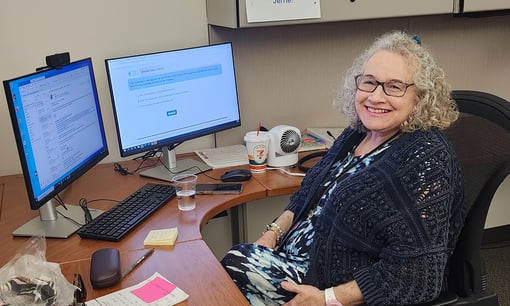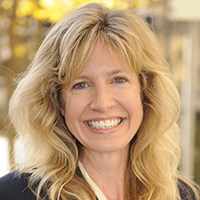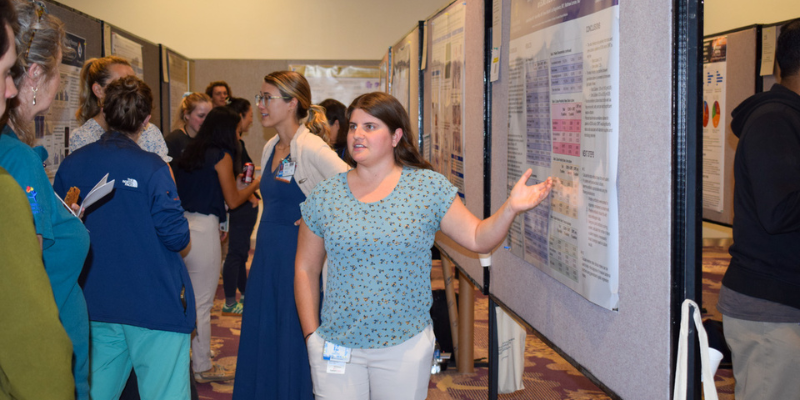Clinical research is one of the primary reasons the University of Colorado Anschutz Medical Campus is a nationally renowned healthcare destination. Yet in 2019, only 25% of CU Anschutz adult clinical trials enrolled even one participant over age 50. Study results may not apply to all populations, so the National Institutes of Health (NIH) requires clinical research to include individuals across the life span.
Kady Nearing, PhD, is leading an innovative solution to the problem of a lack of older adults participating in clinical trials. Her NIH-funded project is training Older Adult Research Specialists (OARS) to help educate and recruit adults over 50 who may want to participate in clinical studies. The Colorado Clinical and Translational Sciences Institute has been putting a focus on recruiting participants in clinical research—the OARS program is key to this effort.
“We are training and promoting the hiring of Older Adult Research Specialists to increase the inclusion of older adult peers in clinical trials,” said Nearing, assistant professor in the Division of Geriatric Medicine at the CU School of Medicine.
OARS (who are on average 69 years old) bring their lived experience, professional skills, connection to older adult communities and extensive training to promote and facilitate the inclusion of older adults in clinical trials. They complete 14 weeks of intensive education, with health navigation training serving as a foundation.
The process uniquely prepares them to fulfill key roles as part of clinical trial teams that engage with Colorado communities to enhance recruitment. They can facilitate informed consent and help participants stay in the trials by identifying potential barriers, finding solutions and connecting participants to needed resources to support retention during the course of the trial.
First OARS Graduates
The first cohort of eight OARS graduated this past June and another 10 will graduate in mid-November. These individuals look forward to beginning their “encore” careers at the university, helping to enrich the university’s research workforce. And all can be hired by faculty members who are conducting studies, just as they might hire other clinical coordinators on campus.
“I am so thrilled to be working at Anschutz,” said OARS graduate Jerrie Dansky (pictured below). “This is the first time in my adult work life where I’m proud to wear my name badge! It has only taken me to age 67 to find meaningful work.”
 Dansky is a Colorado native and graduate of the University of Denver. She has spent her life working in a variety of capacities in the nonprofit and private sectors. She was drawn to the OARS program for its meaningful opportunities. “I feel like I am doing important work where I can make a difference.”
Dansky is a Colorado native and graduate of the University of Denver. She has spent her life working in a variety of capacities in the nonprofit and private sectors. She was drawn to the OARS program for its meaningful opportunities. “I feel like I am doing important work where I can make a difference.”
Research Road Shows
Nearing’s project aims to attract participants from across all regions geographically as well as by age. Over the next two years, she and colleagues from the Multi-disciplinary Center on Aging will host “Traveling Research Road Shows.” The goal is to fan out to geographically across Colorado communities where research teams can directly engage with and educate older adults about research and its importance to healthcare. The shows will address the information gap and digital divide that contributes to the schism between researchers and communities. “We aim to increase access to opportunities to participate in research for all populations,” Nearing said.
The final component of the project is a new, free “Inclusion of Older Adults in Research Consultation Service,” which will be staffed by the OARS program. The service will give researchers new ideas and resources to support their recruitment and retention efforts. Nearing encourages faculty to sign up now while there is no consultation cost.
Age-Friendly University
In 2021, CU Anschutz became the first academic medical campus in Colorado to achieve the designation as an Age-Friendly University. Three priorities anchor the Age-Friendly University work: research innovation, encore careers and intergenerational learning. Nearing’s project includes all three priorities.
Dansky said, “It’s important that older adults have a voice in clinical trials. We are a large segment of the population and should not be forgotten in terms of what we have to say and what we have to offer. Our voice matters!”
To learn more about how to hire OARS or participate in the Research Road Show, please contact Jodi.Waterhouse@cuanschutz.edu.
Photo at top: From left, Older Adult Research Specialists Faythe Huston and Betsy Hay demonstrate the use of a decision support tool for older adults who are considering enrolling in a clinical trial. Huston, Hay and Barbara Creswell created the tool with input from other older adults.
.png)


.png)
-1.png)